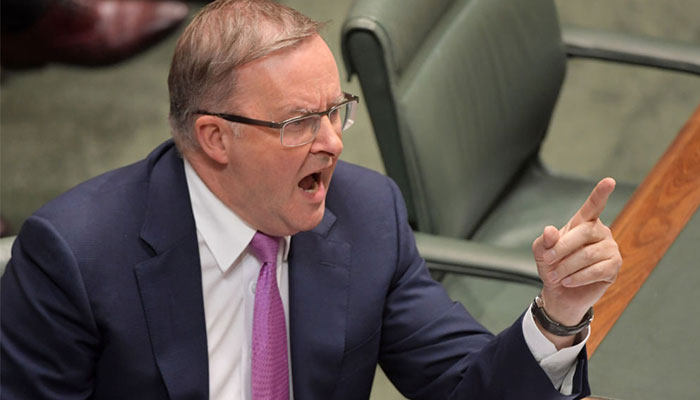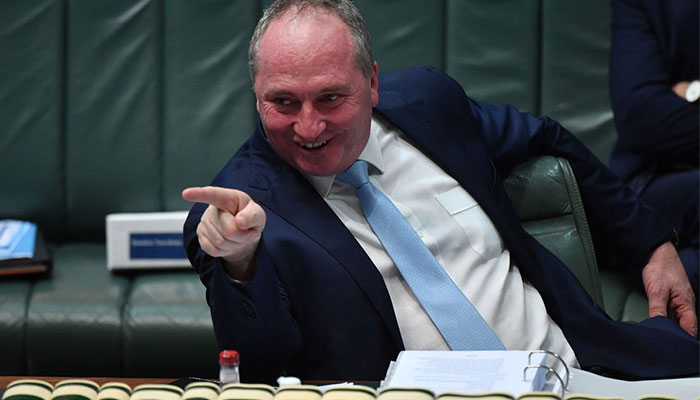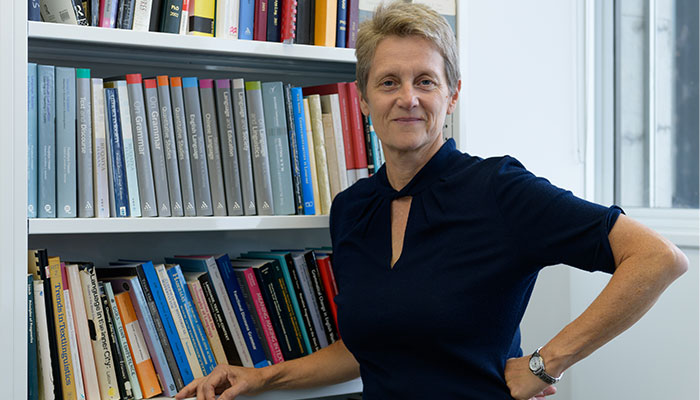Parliament is a place for talk. In fact the name for this institution derives from the French verb parler, meaning to talk.

Heated: "Sit down, boofhead," said the-then Opposition Leader Anthony Albanese (above) said to Defence Minister Peter Dutton in Federal Parliament in 2021.
And parliament is known as a place for tough talk. It is where politicians come head-to-head over decisions that can affect millions of people, as well as their own much-prized careers.
It is not surprising that it can get a bit spicy sometimes. Better that disagreements are done by words, not by pushing, punching or jumping on your opponents, as we see from time to time in the South Korean National Assembly.
Because of the very necessary work that parliament has to carry out, our politicians enjoy a freedom of speech that is not given to ordinary citizens. It's called parliamentary privilege.
Parliamentary privilege gives politicians special legal rights and immunities so that they can speak freely without fear of prosecution. Politicians are, for instance, immune from being sued for defamation.
But it is not a free-for-all in our parliamentary chambers. Politicians' speeches and debates are subject to some hefty rules. It is the job of a parliament's Speaker to make sure the members obey these rules.
You can read the list of rules for the Parliament of Australia here. If you want to know why our politicians do not use each other's names in Parliament – such as 'Anthony' or 'Peter' – but rather, the 'Honorable Member for Grayndler', or the 'Honorable Member for Dickson' – it is because that's the rule.

King of the zinger: Former Prime Minister Paul Keating (above) was famous for his often amusing insults, including: "The Opposition crowd could not raffle a duck in a pub." He described political opponent Peter Costello MP as "all tip and no iceberg".
If a politician indulges in 'persistent irrelevance or tedious repetition', then the Speaker can ask them to sit themselves right back down.
The rules have their own special section on 'offensive or disorderly words'. Pollies can 'parle hard' – but they can't insult another member of parliament, or use the swear words that are an essential part of many Aussie conversations.
Obviously, some of the more taboo insults – such as the f-word and the c-word – are out of bounds. And a politican cannot call another member a 'liar'.
Members of the Australian Parliament and of state parliaments have been ejected from chambers for all kinds of 'unparliamentary' language – routine insults, highly popular swear words, or the suggestion of unprofessionalism. Here's a list from 10 years of speeches and debates in the Queensland Parliament – members have been thrown out for describing another member as a 'pipsqueak', a 'moron' or a 'clown', or for describing them as 'spineless' or 'weak'.
Language is extremely powerful, and humans have feelings. When the full power of language is unleashed, the consequences are shattering.
In the Australian parliament, the Independent Senator David Pocock was asked to withdraw his 'unparliamentary' language when he used the word 'bullshit' to refer to climate denialism. Independent MP Zali Steggall withdrew her use of the word 'racist' when referring to the Opposition Leader Peter Dutton, although she continued, outside the Australian parliament, to describe his party's policy in these terms.
Frequently deriding those on the opposite benches of parliament as 'dimwits', 'blockheads' and 'intellectual hoboes', the former Prime Minister Mr Paul Keating also once said: "Those opposite could not manage a tart shop."
Leading Liberal Party MPs of the time came in for Mr Keating's harshest treatment, including referring to the-then Opposition Leader John Howard as a "little desiccated coconut", the future long-serving Treasurer Peter Costello as a "low-altitude flyer", and the two-time election loser Andrew Peacock as a "painted, perfumed gigolo" and a "gutless spiv".

Slur: Politician Barnaby Joyce (above) branded Prime Minister Anthony Albanese a "sook" in a parlimentary clash in August this year.
It is fashionable to go on about these kinds of regulations as being too 'politically correct' – or what we now call being 'woke'. Free speech warriors want to argue that our fundamental freedoms should include the right to say anything, anywhere, to anyone — while many of them at the same time often take offence when they are themselves the subject of insult.
But there are two very important reasons to step back from this extremist view. Language is extremely powerful, and humans have feelings.
When the full power of language is unleashed, the consequences can be shattering. Check out this UN news report on how hate speech was an essential fuel for the 1994 genocide in Rwanda.

Words matter: Associate Professor Annabelle Lukin (above) researches language used in politics, media, healthcare and literature.
Rules are never perfect. They won't stop some members of parliament from sailing very close to, or crossing, the line. Some female politicians have called out their parliamentary colleagues, particularly from the current Opposition, for behaviour the women consider 'aggressive' and 'often misogynistic'.
Democracy requires faith in our parliaments and some measure of respect shown by its members for each other. To think before you speak is a sign of maturity and generosity. We simply could not live in a world where we all say whatever we like whenever we feel like it. To paraphrase Yeats, the centre would not hold, and anarchy would be loosed upon the world.
Annabelle Lukin is an Associate Professor in the Department of Linguistics, in the Faculty of Medicine, Health and Human Sciences.






